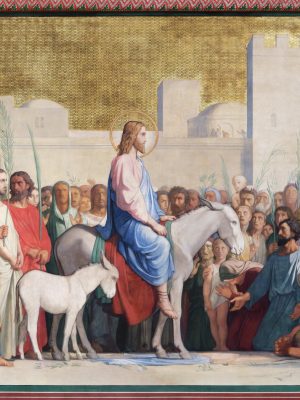Looking for Trouble? “Do not let your hearts be troubled” (Jn 14:1).
What do you have to do to let your heart be troubled? Nothing. Just do nothing and your heart will gravitate downward toward trouble—not upward to joy, but to trouble: the next obstacle, trial, or conflict. The Lord wants us to work against our tendency to be preoccupied with troubles. The Apostles at the Last Supper have trouble and worry written all over their faces. Does it seem unthinkable? To be so close to the Lord and still so distressed? Just feet away from the Prince of Peace, from the One who calms storms at sea, and we are distracted by what’s coming next.
I’m not sure how I would have felt being at table with Jesus, hearing Him speak mysterious words of farewell and return, and then telling me not to let myself get anxious. But right now, the Lord’s words make us reflect on what does trouble us, what makes us anxious, and whether it too often gets the better of us.
I suppose our Lord could ask each of us a variation on the question He addressed to Philip: “Have I been with you for so long a time, and still you do not know me” (Jn 14:9)? Saint John Henry Newman rephrases the question: “Have I been so long with you, and you do not yet trust Me, and cannot remain in peace and quiet by My side?”[1] Newman, in fact, does direct the question to us:
“And so, my Brethren, He says [this] to us now. All of us who live in this mortal life, have our troubles. You have your troubles, but when you are in trouble, and the waves seem to mount high, and to be soon to overwhelm you, make an act of faith, an act of hope, in your God and Saviour. He calls you to Him who has His mouth and His hands full of blessings for you.”[2]
Newman really gets at the root problem: We are often so preoccupied with the next trouble that we are not open to being blessed—blessed, perhaps, even by the very circumstances that are trying us.
To us the Lord might say: Have I been with you all this time and still… Still what? You still won’t throw away your plans and ambitions, the control, the fear that you carry around with you as you try to follow me. Or your selfishness, anger, pettiness which always manages to spoil your good work. You still won’t set aside the resentment because things have not turned out as you had planned.
All of this points to a problem in our Christian journey that St Thomas’s question hits on the head: “‘Lord, we do not know where you are going; how can we know the way?’ Jesus said to him, ‘I am the way…’” (Jn 14:5-6). Sometimes our anxiety stems from wanting to bend the path the Lord has set us on. The fear that things will turn out badly if I can’t control the outcome, or if I have to follow a path that makes me feel unsure of myself or inadequate.
St Peter began to walk on water by Jesus’ permission and the Gospel has a telling comment on what happened. Walking on troubled waters, “[Peter] saw the strong wind, he was afraid, and beginning to sink he cried out, ‘Lord, save me’” (Mt 14:29-30). When trust in Jesus fails, when we take our eyes off of Him, even for an instant, there are consequences. He was walking on water and he faltered. We walk on firm ground and what happens to us?
Or when the Lord corrects Martha for being troubled: “Martha, Martha, you are anxious and troubled about many things; one thing is needful. Mary has chosen the good portion, which shall not be taken away from her” (Lk 10:41-42). She was busy doing work for the Lord, but in the midst of it she had also lost sight of Him for whom she was doing it—and He was always sitting in the next room. We too work for the Lord, but whom we cannot see, and what happens to us?
In each case you have disciples very close to the Lord, at table with Him, or entertaining Him at home, even standing on the ocean, and something interior fails. And there is a falling back on our instincts: fear, irritation, self-protection. When we lose our focus, we lose our peace; when we lose our peace, we lose confidence and trust in God. And then we begin to inventory our own resources, which are no better than a few barley loaves and a pair of dried fish. And pretty soon we have forgotten that the Lord is actually looking to bless us.
St John of the Cross pleads for this awareness in a short, powerful prayer: “Awaken and enlighten us, my Lord, so we might know and love the blessings that you ever propose to us, and we might understand that you have moved to bestow favors on us and have remembered us.”[3]
To follow Christ as the Way each day of our lives, we have to be more preoccupied with seeking Him and His blessings than with the next struggle facing us. For instance, as we celebrate and conclude the sacred liturgy each day, are we preoccupied with how the Lord will speak to us this day, bless us, challenge us, give us life, or call us to die to ourselves? Do we say: I so want to be ready when He calls that I plan to be vigilant before Him all day? Or are we instead preoccupied with our agenda, our stuff, our whatever?
The itinerary of the Christian life often involves troubling situations, personal troubles, both foreseen and unexpected. We cannot and should not avoid them. The Lord tells us to expect it all: “In the world you have tribulation” (Jn 16:33). The difference is how we look at it: as opportunities for blessing or occasions that we merely dread and endure. The basic orientation of Christian life must be one of anticipation and vigilance. The Lord repeatedly exhorts us to this. And what do His servants find when their expectation has been fulfilled? Blessings.
“Blessed are those servants whom the master finds awake when he comes; truly, I say to you, he will gird himself and have them sit at table, and he will come and serve them. If he comes in the second watch, or in the third, and finds them so, blessed are those servants!” (Lk 12:37-38).
[1] John Henry Newman, Faith and Prejudice and Other Sermons:Sermon 1. “The Omnipotence of God the Reason for Faith and Hope,” Fourth Sunday after Epiphany, 30th January 1848. https://www.newmanreader.org/works/ninesermons/sermon1.html
[2] “The Omnipotence of God the Reason for Faith and Hope.”
[3] John of the Cross, The Living Flame of Love, stanza 4.








